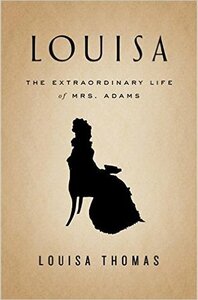You need to sign in or sign up before continuing.
Take a photo of a barcode or cover
When you read books about history or famous historical figures, do you ever think about the people who could be called the "supporting cast?" They are generally the regular people who aren't famous or infamous, but who played some important but sidelined role in events or who offered just the right support or influence that helped the famous person in some critical way. I think about those people a lot because most of us have much more in common with those kinds of people than the really famous ones. Also, they are often women.
I like this book because it focuses on what most of us would see as a supporting character. Louisa was married to John Quincy Adams, son of the John Adams. In most history books, she'd be mentioned as his wife and not much more would be said, but the truth is that she lived an interesting--even as the book claims--extraordinary life and it would be a shame if her story had never been told.
I like this book because it focuses on what most of us would see as a supporting character. Louisa was married to John Quincy Adams, son of the John Adams. In most history books, she'd be mentioned as his wife and not much more would be said, but the truth is that she lived an interesting--even as the book claims--extraordinary life and it would be a shame if her story had never been told.
Somewhat Repetitive
A very long and tedious read with accounts of nearly every political session she encountered, as well as every party attended, and everytime she felt faint. While well researched and informative on a person I knew little of, it was almost too much detail. Otherwise enjoyable to read about.
A very long and tedious read with accounts of nearly every political session she encountered, as well as every party attended, and everytime she felt faint. While well researched and informative on a person I knew little of, it was almost too much detail. Otherwise enjoyable to read about.
"In the American tradition of autobiography, she meant to encourage emulation. It was the story about the making of a self--and in particular, a female self. She wanted to show that women were stronger and braver than they were said to be. She thought her story might 'show that many undertakings which appear very difficult and arduous to my sex, are by no means so trying as imagination forever depicts them.'" (p. 411)
Before reading this compelling biography, what I knew about Louisa Johnson Adams--wife of John Quincy Adams--was that she had journeyed across Europe during the Napoleonic Wars, was musical, and didn't get along particularly well with her mother-in-law, Abigail Adams. There is so much more to her life: born in England in 1775, she was the daughter of a Marylander who was brought up to see herself as an American, knowing that her parents wanted her to marry an American. She wound up marrying John Quincy Adams and lived with him in Germany before first setting foot in the United States in 1801. She lived with him in St. Petersburg and France and England; she was hostess for him and helped him get elected President (well, he became President, at least; the election of 1824 was a bit dubious). She suffered through many miscarriages and the loss of three of her four children.
Louisa Adams is a mass of contradictions; Thomas doesn't hesitate to point out her inconsistencies or back away from her faults, but the Louisa Adams portrayed in this book is completely fascinating, and ultimately comes across as someone to admire. She battled ill health throughout her life, but managed to power through when called upon. She was full of self-doubt and lacked confidence in her knowledge, but was a witty, astute correspondent who as she grew older, didn't hesitate to ask questions. Her marriage to John Quincy is a total mystery; the two seemed frequently to not at all get along (divorce was discussed at one point), and Louisa not infrequently portrayed it as completely unhappy--but the two clearly did have a good deal of affection for each other. (Though I did spend a lot of the book thinking that John Quincy sucked.)
Like many of her contemporaries, she abhorred slavery as a concept, but remained completely racist and was of the "Let's just leave it alone and just live in peace" attitude. One of the things I most appreciated about this book is Thomas's depiction of the life of the Adamses in Washington; they didn't own enslaved people themselves, but certainly had enslaved people in the house. Thomas illustrates how enmeshed the system was. Enlightening and horrifying.
The end seemed a bit rushed, but this was a great book.
Before reading this compelling biography, what I knew about Louisa Johnson Adams--wife of John Quincy Adams--was that she had journeyed across Europe during the Napoleonic Wars, was musical, and didn't get along particularly well with her mother-in-law, Abigail Adams. There is so much more to her life: born in England in 1775, she was the daughter of a Marylander who was brought up to see herself as an American, knowing that her parents wanted her to marry an American. She wound up marrying John Quincy Adams and lived with him in Germany before first setting foot in the United States in 1801. She lived with him in St. Petersburg and France and England; she was hostess for him and helped him get elected President (well, he became President, at least; the election of 1824 was a bit dubious). She suffered through many miscarriages and the loss of three of her four children.
Louisa Adams is a mass of contradictions; Thomas doesn't hesitate to point out her inconsistencies or back away from her faults, but the Louisa Adams portrayed in this book is completely fascinating, and ultimately comes across as someone to admire. She battled ill health throughout her life, but managed to power through when called upon. She was full of self-doubt and lacked confidence in her knowledge, but was a witty, astute correspondent who as she grew older, didn't hesitate to ask questions. Her marriage to John Quincy is a total mystery; the two seemed frequently to not at all get along (divorce was discussed at one point), and Louisa not infrequently portrayed it as completely unhappy--but the two clearly did have a good deal of affection for each other. (Though I did spend a lot of the book thinking that John Quincy sucked.)
Like many of her contemporaries, she abhorred slavery as a concept, but remained completely racist and was of the "Let's just leave it alone and just live in peace" attitude. One of the things I most appreciated about this book is Thomas's depiction of the life of the Adamses in Washington; they didn't own enslaved people themselves, but certainly had enslaved people in the house. Thomas illustrates how enmeshed the system was. Enlightening and horrifying.
The end seemed a bit rushed, but this was a great book.
I knew very little of the life and times of our sixth President, but am intrigued by biographies of First Ladies; this biography was very satisfying in that regard.
Louisa Adams is hard to relate to from the distance of almost 200 years, largely due to the way women were expected to behave during her lifetime. She struggles with not considering herself to be very intelligent, with being a woman who needs much love and affirmation from the men in her life, even as they consistently disappoint her, and with her journey to find her voice. She was much more the woman behind the throne than she should have been for the times, but she also suffered from great depressions (12 miscarriages will probably do that to you, as well as the death of a young child), and frequently took to her bed with a variety of ills - whether real or imagined.
Her internal conflict over slavery, her burgeoning awareness of the equality of women, her insecurity in her marriage, her feelings of inferiority, all paint the picture of an interesting and - to me, at least - little-known woman. I also gained greater insight into the person of John Quincy Adams and the role he played in working toward the abolition of slavery nearly 20 years before the Civil War.
Although sometimes the book is a bit tedious, I was fascinated by this story of a woman who could be so physically/psychically debilitated that she couldn't leave her bed, yet could undertake a 40-day trip to Russia, making all arrangement and decisions along the way, with no help from her husband and only the company of young and unreliable servants. All in all, Louisa Catherine Johnson Adams was quite a remarkable woman!
Louisa Adams is hard to relate to from the distance of almost 200 years, largely due to the way women were expected to behave during her lifetime. She struggles with not considering herself to be very intelligent, with being a woman who needs much love and affirmation from the men in her life, even as they consistently disappoint her, and with her journey to find her voice. She was much more the woman behind the throne than she should have been for the times, but she also suffered from great depressions (12 miscarriages will probably do that to you, as well as the death of a young child), and frequently took to her bed with a variety of ills - whether real or imagined.
Her internal conflict over slavery, her burgeoning awareness of the equality of women, her insecurity in her marriage, her feelings of inferiority, all paint the picture of an interesting and - to me, at least - little-known woman. I also gained greater insight into the person of John Quincy Adams and the role he played in working toward the abolition of slavery nearly 20 years before the Civil War.
Although sometimes the book is a bit tedious, I was fascinated by this story of a woman who could be so physically/psychically debilitated that she couldn't leave her bed, yet could undertake a 40-day trip to Russia, making all arrangement and decisions along the way, with no help from her husband and only the company of young and unreliable servants. All in all, Louisa Catherine Johnson Adams was quite a remarkable woman!
I thoroughly enjoyed this. Here is a woman whose life story would have been completely lost to history had she not married a future President of the United States, and even then it took many generations before biographers took much interest. Women's history is like that.
Anyone with more than passing interest in early America will profit mightily from learning more about Louisa Catherine Johnson Adams. Like our country itself, she was flawed and frail, but could rally through times of great stress to be strong as steel. Like America's male founders, she was fiercely devoted to the ideals of liberty and self-governance, but sometimes found democracy messy. At a young age, she had irreversibly connected herself to a curmudgeonly and hyper-intellectual husband who ran hot and cold on her and caused her to question her own worth. She had as many as 11 miscarriages, lost three other children, and suffered ill health. But she was a survivor. She persisted. She created value for herself and those around her. She left us a legacy.
Many thanks to the author for bringing this story to light!
Anyone with more than passing interest in early America will profit mightily from learning more about Louisa Catherine Johnson Adams. Like our country itself, she was flawed and frail, but could rally through times of great stress to be strong as steel. Like America's male founders, she was fiercely devoted to the ideals of liberty and self-governance, but sometimes found democracy messy. At a young age, she had irreversibly connected herself to a curmudgeonly and hyper-intellectual husband who ran hot and cold on her and caused her to question her own worth. She had as many as 11 miscarriages, lost three other children, and suffered ill health. But she was a survivor. She persisted. She created value for herself and those around her. She left us a legacy.
Many thanks to the author for bringing this story to light!
Louisa Adams was a complex and misunderstood woman full of intelligence, strength and flaws. She lived an interesting life not fully in her control and always in the shadow of someone else. The book was extremely well written and told the story of Mrs Adams with the right amount of details and story. It was always interesting, flowed well and I was sorry when it ended.
I was very frustrated with the men of the time especially John Quincy and his behavior. And Thomas Jefferson pretty much sounds like a total jerk.
I was very frustrated with the men of the time especially John Quincy and his behavior. And Thomas Jefferson pretty much sounds like a total jerk.
Here is a portion from my upcoming article, Great Women, Great Stories for VOYA magazine. It also includes comments from the author, Louise Thomas.
A fascinating account of Louisa Catherine Johnson Adams, wife of John Quincy Adams and the time that she lived in. The book draws on the prolific and massive trove of letters, diaries, poetry, plays, translations, and memoirs that Louisa Adams created during her lifetime. Thomas’ biography gives a wonderful sense of Louisa as a person in her own right, despite the fact that she has been historically portrayed as sickly and delicate and often in comparison to her mother-in-law, Abigail Adams.
Thomas’ biography widens our perspective of Louisa not only as John Quincy Adam’s wife, but as someone who proved herself shrewd, independent and a refined political thinker. She was unusually observant, says Louise Thomas, and knew exactly how to put people at ease. “She knew that relationships were crucial in politics, as they are today too,” said Thomas. “She had a fantastic political intelligence and she believed that women’s minds were unjustly shackled.” And while Abigail Adams had a real sense of her family’s place in history, says Thomas, Louisa was a bigger social presence. “She was in some ways, a woman of her time,” said Thomas. In fact, she was so admired that on her death, “both houses of Congress adjourned as a mark of respect.” Leaving her son, Charles, to later remark in his diary, “’This is a thing unexampled in our history thus far.’” (Thomas, 2016)
A fascinating account of Louisa Catherine Johnson Adams, wife of John Quincy Adams and the time that she lived in. The book draws on the prolific and massive trove of letters, diaries, poetry, plays, translations, and memoirs that Louisa Adams created during her lifetime. Thomas’ biography gives a wonderful sense of Louisa as a person in her own right, despite the fact that she has been historically portrayed as sickly and delicate and often in comparison to her mother-in-law, Abigail Adams.
Thomas’ biography widens our perspective of Louisa not only as John Quincy Adam’s wife, but as someone who proved herself shrewd, independent and a refined political thinker. She was unusually observant, says Louise Thomas, and knew exactly how to put people at ease. “She knew that relationships were crucial in politics, as they are today too,” said Thomas. “She had a fantastic political intelligence and she believed that women’s minds were unjustly shackled.” And while Abigail Adams had a real sense of her family’s place in history, says Thomas, Louisa was a bigger social presence. “She was in some ways, a woman of her time,” said Thomas. In fact, she was so admired that on her death, “both houses of Congress adjourned as a mark of respect.” Leaving her son, Charles, to later remark in his diary, “’This is a thing unexampled in our history thus far.’” (Thomas, 2016)
Read this in 2022 after having it for a few years. I guess my review might be based on this book being a biography, but it took me forever to read. I try to read different stuff and not just the same genres of books. I found interesting the character of Louisa, but not so much her family. John Quincy’s journey is in here too and I didn’t feel like it overpowered Louisa’s story, but added to it. It seemed to me the writer did her due diligence in finding a lot of information and her writing is easy to read.



